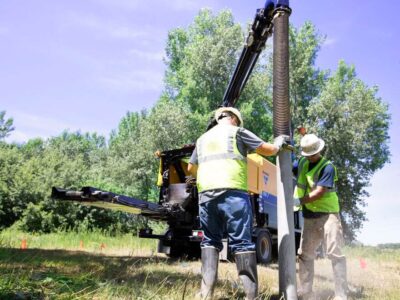With applications ranging from potholing utilities and leak detection to ongoing refinery and pipeline maintenance, vacuum excavators are essential machines for the oil and gas industry. Many contractors and pipeline companies depend on vacuum excavator specialty companies to do this work, but the need for this type of equipment is growing — and so is the need for more contractors to get into the vac market.
Opportunities in the field include potholing utilities and pipeline maintenance
According to Andy Bremner, external sales manager for Pipeline at Vermeer, it has taken a bit longer for vacuum excavator use to expand in the pipeline industry compared to the utility market, but there has been a dramatic increase in usage within the last few years. “Almost every utility horizontal directional drill contractor owns their own vacuum excavators and uses them daily for drilling fluid management and daylighting existing utility lines,” he explained. “It’s taken large diameter HDD contractors more time to embrace owning and operating their own vacuum excavators because mud recycling systems and pumps are more widely used for drilling fluid management. They are used to bringing specialists like steering hands to support their operations. However, a growing number of these same contractors are now adding vacuum excavators to give their team better control of project timelines.”
Jake Jeffords, director of sales, marketing and global accounts at Vermeer MV Solutions, added that pipeline companies and contractors regularly employ vacuum excavators to assist on projects, which means these trucks are in high demand. “These specialists do a nice job, but they can’t be everywhere all at once, and many general and subcontractors are investing in their own vacuum excavators to keep their projects on their schedule. It just makes sense because it gives them better control of timelines and costs,” he explained.
Taking control of expenses and timeline
Elaborating on those two points, Jeffords said new pipeline construction is often delayed because vacuum excavation crews can’t keep up with all the different aspects of a project they get pulled into. “Hired specialists can’t be daylighting utilities on the next phase of a job if they are assisting a contractor with drilling fluid disposal on the current phase,” he explained. “So, crews are either waiting for vacuum excavator operators to suction slurry pits or waiting for them to expose existing utilities for the next drill shot — and waiting can be expensive.”
Analyzing the expenses of hiring a vacuum excavation service and crew idle time, many pipeline contractors have concluded that investing in their own vacuum excavator truck makes more financial sense. “The upfront investment of a large vacuum excavator is the reason why many contractors — large and small — choose to hire someone else,” said Bremner. “But, when they compare what they are paying someone else to do the job against the costs of owning the machine, they usually find that adding a vacuum excavator is a good investment. Now, they can better control their operational costs on a project because they don’t have to pay whatever the going rate for vacuum excavation services is in the area, and can better manage the timeline of the project.”
Transmission line support and opportunities
Pipeline contractors with vacuum excavators usually find many additional opportunities to put their fleet to work. It doesn’t matter if they’re using trenchless or open-cut installation methods. Everything must be exposed, which means employing a vacuum excavator powerful enough to dig up to 30 ft (9 m) deep. So, small utility vacuum excavators aren’t going to get the job done — it’s a job for 6 in (15 cm) and larger vacuum excavators.
Transmission pipelines also subcontract out ongoing transmission maintenance and repair jobs. “Transmission lines need to be checked regularly to ensure they are holding up well in the ground,” Bremner explained. “Crews need to spot exposed pipelines and look for corrosion, and they typically will only allow soft excavation methods around active transmission lines. Also, if a leak is suspected, vacuum excavators will be employed to verify a leak and aid with repairs.”
Vacuum excavation opens doors at refineries
Companies with large vacuum excavators are also finding additional opportunities at refineries. According to Jeffords, many plants have a stringent mechanical digging permitting process that can take up to six months before access is granted. However, plant owners are much more accepting of excavating onsite with vacuum excavators. “Vacuum excavators are used for everything from repairing leaks to cleaning separators. There is almost always a vacuum excavator or two working at every refinery to ensure everything is working properly, and there is a need for more support to keep everything running at peak efficiency.”
Rely on a trusted partner to expand your business
Getting into a new line of work can be challenging for contractors looking to expand their business into vacuum excavation services. Having a trusted network of professionals in the oil and gas field is always helpful for making the transition go smoothly. Vermeer and its global dealer network have served the oil and gas pipeline industry for decades, from delivering the equipment needed for new pipeline construction to providing hands-on expert advice for crews in expanding their operations. They will be there for you, too. So, give your local Vermeer dealer a call to learn more about how adding a vacuum excavator can help provide more operational and timeline management control.
Vermeer MV Solutions, Inc. reserves the right to make changes in engineering, design and specifications; add improvements, or discontinue manufacturing at any time without notice or obligation. Equipment shown is for illustrative purposes only and may display optional accessories or components specific to their global region. Please contact your local Vermeer dealer for more information on machine specifications.
Vermeer and the Vermeer logo, are trademarks of Vermeer Manufacturing Company in the U.S. and/or other countries. © 2023 Vermeer MV Solutions, Inc. All Rights Reserved.
